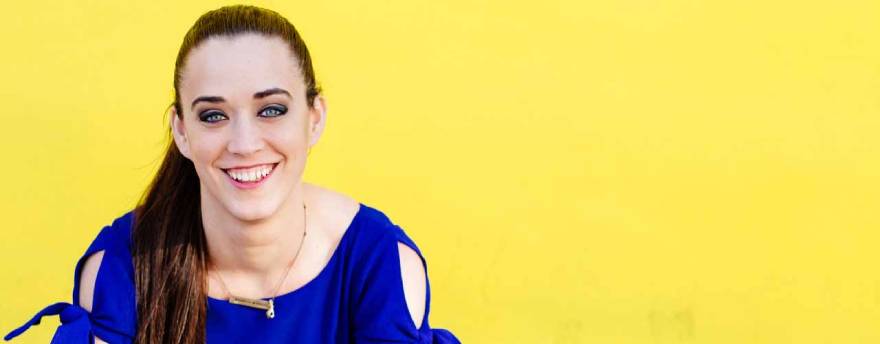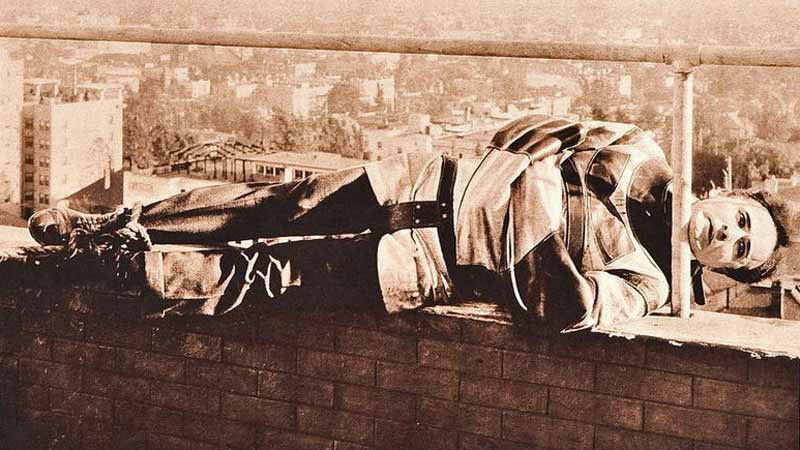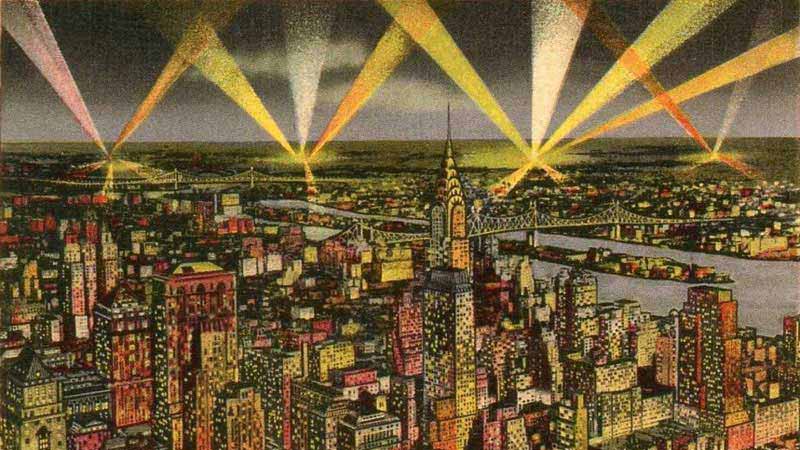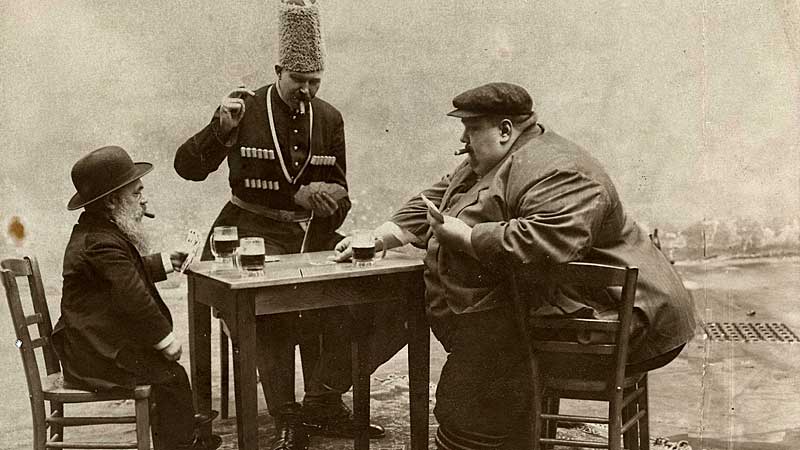Kayla Drescher's "The 'Glamorous' Life of a Touring Magician" Podcast Interview
by Christian Painter and Roland Sarlot

What We'll Explore
Criss-crossing the globe with a large illusion show, close-up artist Kayla Drescher shares how to play big and connect with theater crowds, collaborating with a team, and what you learn after 250 nights a year on the road!
Who is Kayla Drescher?
Kayla Drescher has toured the world as one of the magicians in the "Champions of Magic" production show. Specializing in close-up magic, she has learned to pack small and play very big with a camera and a dramatic personality. She works regularly at Magic Castle, awarded David Copperfield's "Next Great Magician" contest, and had a highly acclaimed appearance on Penn & Teller: Fool Us where she performed her own original magic.
Running Time:
The following interview has been edited and condensed for clarity.
What you can do
You are welcome to share up to 500 words of the below transcript in a non-commercial purpose provided you credit and link back to our site like this: "The Magic Oracle Business Podcast".
The Interview
Christian Painter: On this exciting episode of the Magic Business Podcast...
Kayla Drescher: You know, there are really specific rules to sleeping on a tour bus. The one that I always find really interesting is you have to have your head facing the back of the bus because if you're facing the wrong way and the driver slams on the brakes... your head goes through and you're dead.
Christian Painter: Welcome to the Magic Business Podcast where we share insightful and delightful inner secrets about the business of magic. This is where magic professionals present their real-life experiences and some of their most guarded secrets to help further your career in the magical arts. I'm your host, Christian Painter, in partnership with the MagicOracle.Club, where you can hear all of our Magic Business podcasts.
Kayla Drescher is a professional magician based out of L.A. She won the David Copperfield's “Next Great Magician” contest. She had a highly acclaimed appearance on Penn & Teller: Fool Us where she performed her own original magic. She also works at Magic Castle all the time. For the last three years, she has toured the world as one of the magicians in the "Champions of Magic" production show. If you have ever dreamed of touring a big magic show, pay attention to this interview. Kayla, welcome to the show.
Kayla Drescher: Hey, thank you for having me.
Christian Painter: Well, I'm excited to have you because you're literally doing what I think most magicians dream of, which is touring the world in a large production magic show.
Kayla Drescher: That tends to be what I've heard from a lot of magicians, that this would be the ultimate end-all, be-all that's where I want my career to go “one day” kind of dream.
Christian Painter: I think it's great that you're on because you can explain to them that it might not be... when we dig in a little deeper. So I think the best way to start is to give me an example of what a day is like for you on tour.
Kayla Drescher: So every day is completely different, so I'll give you sort of what looks like a normal show day but then kind of tell you about the variable days that will exist in between. So our show is massive. There's pyro, lights, set design, illusions. I'm just the close-up magician so even though what I do is projected on a screen, I don't need to set any of that up. I just kind of roll in and I set up my own props. And it all just lives in a box on our truck. So I'm really simple. I don't have to do too much strenuous, like, heavy lifting of stuff.
But our crew usually starts loading in around 8:00 or 9:00 in the morning and they'll load in. Sometimes, depending on the local crew, and if everything goes off without a problem, then they might be done loading in around 6:00, around dinnertime, and our show will be at 7:30. So it's an all-day process and then loading out is much quicker. The show will be done around 10:30, 11:00. We'll be done then with the meet-and-greet, you know, around maybe 10:00, and then we're loading out until 12:00, 1:00 a.m. And often, when we have what we call one-off shows, which are just you do one show in a location, next day is a different show in a different location, we'll load out. We get back on the tour bus and the bus drives overnight as we sleep in our little, itty-bitty bunks. And then we'll do it all again the next morning.
So during that day, I'll roll in maybe around lunchtime, usually, that's when the cast is called. And from lunchtime up until showtime, we're getting ready for the show. We're talking about last night's show. We're working with each other on giving each other notes, working on new material. We're helping each other with angles during tech. We'll rehearse a new piece if we have time for that. And then any sort of traditional help we can provide the crew, we'll try to do that, too. So, we're pretty much constantly thinking about the show. So it's from the moment you're in tour mode, you've left your home, you're on the plane, you're thinking about the show. So every moment, you're just show, show, show, show, show.
When there are not show days, well, if we're on a tour bus... Tour bus is definitely a weird life, so that's where we live. But we'll have to find like, "Where do we shower today? Is it in the theater, or did the producer need to get us hotel rooms at like a halfway stopping point between shows so we can all spend the day showering, and if there's a gym, great?" So you kind of are getting what you would normally have at home and all those luxuries of being in your own home or your own hotel room, you're sharing all of that in a lot of ways. So there's a lot of that sort of navigation just trying to find good food and stay healthy. Sometimes, we have been on a tour bus for a 30-hour road trip, which is very interesting. There are times where we're traveling, we have to get up at 4:00 in the morning to get on a flight to get into somewhere for a show that night, so it's very kind of all over the place. You never know what's gonna be thrown at you, which is often really fun but can get definitely a little exhausting after a while.
Christian Painter: Wow. I need a nap just listening to that.
Kayla Drescher: Agreed. We could take a break, take a nap, and resume this conversation after.
Christian Painter: So people, when they first hear about, you know, this touring and being on a tour bus and flying, they think, "Oh, that sounds like a great life and so much fun and excitement," which it is in the beginning. But, I think, one thing you have to explain to them is how quickly you become exhausted. You know, it's kind of jumping from spot to spot and also being around the same people, continually, no breaks from them.
Kayla Drescher: I'll kind of tell you two things. So there's people and then there's just general lifestyle exhaustion. So with general lifestyle exhaustion, sometimes, it's really hard to sleep because the adrenaline of the show… you're up until 4:00 in the morning. Or the tour buses, maybe the driver is a little bit weird and they're a terrible driver so you're just being woken up, being tossed around in your bunk. People are snoring or whatever it is. So you're exhausted from not sleeping because of that. There was one run read we did, where we were there for two weeks. The hotel provided us food. But the food was, I mean, I don't know where they got it. Like it was roadkill or something. It was awful. Most of us didn't eat. And after about the first week of eating bread and peanut butter every day for every meal, I walked to a CVS with some of my cast and crew mates, got to the CVS; I bought about 16 bottles of Gatorade and walked back and passed out in my hotel room from exhaustion because you're just not always able to take care of yourself like you would if you were home. So you have to navigate diet, exercise, lack of sleep, so those get pretty tiring in that way. Now, that's not every day. Those are definitely few and far between, but it's something that you have to... What I've learned is you have to be prepared for those.
And then in terms of people exhaustion, yeah, you're with the same people every day. Like you don't even...sometimes, you have to take a break from your own family. Yeah, I didn't choose to spend life with these cast and crew. I get to, like, choose my family. So you have to navigate. You know, we're all from a completely different perspective, although we're all the same age and have the same goal of doing a really good show. Sometimes, those perspectives do get in the way and there are arguments. There are very big arguments. But we've learned you got to handle that. Like there's no room for grudges because you still have to do a show later. So you have to figure out how to navigate all of those things. It can definitely be a little bit tricky. But we've been almost the same cast and crew for three years, which is not a typical attribute to most touring magic shows. There's a lot of changeover, especially crew but definitely cast, too. We've been the same, with the exception of maybe two people.
Christian Painter: I'm telling you that's very impressive and I do know that about you. And having talked to other people who've been on these other tours, not your tour but other tours, it doesn't take long where somebody comes with an ego or somebody who's obviously not pulling their weight and no matter how good a magician you are, we don't care, right? And they're gone. So talk about that for a moment.
Kayla Drescher: Our producer has a really good instinct for people. So I met him and I said something very sarcastic, which is my nature. He wasn't quite sure if I was being sarcastic or not, and I was like, "Oh, I'm sorry. I'm very sarcastic." He thought it was brilliant and hired me, basically, on the spot. So he just had a really good instinct for like, "Yeah. She's gonna fit in, not just with the show but with the community, with the society that the show creates." So he very quickly knew. And then I did three shows. And he was like, "Yes, I'd like to offer you this spot for as long as you want it." So here we are. He does a really good job of vetting people in that way.
Christian Painter: And that's actually very impressive. I don't think there's any other show that can say that to a big and large touring show. I want to go now back to you, specifically because you're the close-up performer there. You play to very large audiences. How challenging is it to do this close-up, to make it play?
Kayla Drescher: It's definitely harder than it looks. When I first joined the show, and the first three shows I did were, I think, about 1500 people, and I'm doing magic in the audience. So I'm still trying to figure out where do I look right now. Is it at the camera or is it at the people? This isn't something that I'm used to. It's super weird. But for me, luckily, I have a very big personality. And that really came from, like, I understood how to do close-up magic at a stage magic level by working behind the bar and doing magic behind the bar because I'm doing close-up for 200 people with no microphone. So I was able to develop that kind of performance ability. And so because of that, I was able to translate my big personality through the lens. So there was a lot of understanding, okay, there are times where I should look at the audience and there are times that I need to make everyone think I'm making direct, personal eye contact with them. And when that happens, I just intensely stare down the lens of the camera. So there's a lot of choreography that's been going on in my brain between people, the camera, the props, all of that. And that's been something that took, probably, a good two years to actually work out and be comfortable with. I'm not sure I could quite articulate it enough to, like, give a lecture, or write a book, or something. But it's definitely something that people continuously are like, "Wow. I've never seen someone work a camera like that." I think that just came from a lot of practice, a lot of watching video, and a lot of going, "Oh, I just need to make it feel like even though I'm doing something small, that it's in people's personal space."
Christian Painter: And let me translate that for some of the younger magicians. What you're saying is there was a ton of rehearsal just with you and the camera.
Kayla Drescher: There was a lot of rehearsal. I mean, as I mentioned, there's a lot of time on a tour bus, so there's a lot of discussion. There's a lot of texting. There's a lot of just 100%, just constantly thinking about it. And sometimes, the camera guy, right before I go on, will go, "Hey, I'm gonna try this thing." And I'll go, "Sounds good." And because we've already rehearsed so much at this point and we trust each other, it will work. So yes, you have to get to the point where, like, yes, you rehearse, rehearse, rehearse, over and over and over again, hours and hours and hours of thinking about one single moment, in order for it to come across as good at it does.
Christian Painter: I know you said the other cast members have some large illusions or props.
Kayla Drescher: Yeah, what a terrible choice.
Christian Painter: Are those their props or they're owned by the tour itself?
Kayla Drescher: So, I believe, Young & Strange or the illusion duo, all of the props are theirs, with the exception, I believe, of the drum set that somehow makes an appearance for seven seconds and then nothing ever happens with it again. And so, besides a couple of things, they own everything. Fernando, who does the escapes, he owns everything. For the most part, with the exception of, usually, some set design, the performer owns the props.
Christian Painter: And I just want the listeners to know that if this is your goal, you're probably going to have to invest some money in whatever those props are and the ATA cases, right? The cases that they're gonna have to… and they're not cheap. If you don't know that, ATA cases are not cheap.
Kayla Drescher: We have this new illusion in the show that, it's the disco ball. So you've seen it, Christian. But without giving too much away, there's a disco ball and a lot happens with it. And I wanna say, at one point, I had heard a figure that Young & Strange had dropped about 60 grand on just this one moment. So illusions are... Again, I got mad when I had to buy a $30 gimmick deck of cards. I was like, "Oh, so expensive." There have been times that I've been like, "Hey, producer of the show, any chance you want to spend some money to buy me this new chair?" And then he'll go, "No." And then I go, "This is very fair. I will accept this. I will buy my own chair."
Christian Painter: Well, I'm glad you brought us down that path because a lot of being hired in a show like that is gonna be negotiating your own salary, so to speak. Correct?
Kayla Drescher: Yeah. Yeah, yeah, yeah. So there's a lot of negotiation in terms of money, in terms of time. I mean, because I do the close-up and because I am rarely, rarely, rarely relying on anybody else besides the camera person, sometimes, it's hard for me to get tech time. And that's just because the bigger stuff, because it's a much larger production show, the bigger stuff is gonna take precedence. And I kind of understand that. But there are times where I have to walk in and go, "I will be getting rehearsal today and there is no negotiation." You kind of have to fight for making sure that your material looks good. It's not a lack of respect given to me. It's the idea that everybody is fighting for that time because there's so little time that yeah, you're negotiating money, you're negotiating rehearsal, you're negotiating just a meeting with the producer to talk about a new thing, all of that. So it is a constant negotiation. I kind of feel bad for the crew because they're just constantly having to tell people, "No." I know our aerialist, because we have an aerialist who does silks on the show, and she's always going, "Is there any way I could get 30 minutes just to warm up on the silk?" And sometimes, they go, "Nope. We can't give that to you."
Christian Painter: Now Kayla, I get it. You have definitely had some rough days but you do get to be a star on the stage for a while. And I got to tell you, are we buying Ferraris? I mean, you got to be making fat, fat... I mean, you just have to have a wheelbarrow? How much money do you have to take out of that place?
Kayla Drescher: Well, I know you're gonna be really surprised at this but that's not true at all.
Christian Painter: Come on.
Kayla Drescher: I do not own a Ferrari, none of that. And, you know, there's a lot that goes into it. But I think a lot of people think, "Oh my gosh. You're performing for 5,000 people. You must be rolling in success." And I'm certainly not, not doing well. I mean, if I weren't surviving, then I wouldn't have stuck with the show for three years but there are a lot of expenses that you don't think about because you're not home. You have to order food to the theater. You have to, you know, eat out. You're constantly eating out, right. That's a huge expense. Airports. You're eating at the airport. That's really expensive. There are so many expenses. Sometimes, my shoes will break, and I'm like, well, I'll use my backup pair today. But I need to go get another pair of shoes and then I've just dropped $100 on a new pair of shoes. Things like that are constantly happening where you're not expecting an expense, but because you're on the road, you don't have the luxury of grabbing stuff at home. Suitcases break. Oh my gosh. I can't tell you how many of my cast and crewmates' suitcases have just disintegrated while being on an airplane. You have no idea what's gonna pop up. So even though it's very comfortable and survivable, we're not rolling in it for sure.
Christian Painter: All right. So I'm not gonna buy a Ferrari but... I'll do all right. And you're not scaring me with your 30-hour bus tour, so I am ready to sign up. So how do I get on one of these big touring shows? Who do I call?
Kayla Drescher: I have no idea. I have no idea who you call. There is no answer because every show is completely different. Sometimes, the production company will put out a casting call. So there's a couple that I know that will say, "Now casting for this run of the show and you could submit a video or have a meeting and an interview," and all of that. For my experience, I had just happened to know somebody who knew the producer. And the producer said, "I need somebody to fill this spot." And this person I knew said, "You should call Kayla." And all of a sudden, I have a job for three years. That is not typical at all.
Christian Painter: And I would tell you, having talked with a few other people who've been on tours, they have very similar stories to you, as I get the feeling that tours go and look for people. It's not the other way around. They have a very set type of performer they're looking for.
Kayla Drescher: Yeah, for sure. Because as the producer of the show, you're trying to have diversity in a lot of different ways in your show, whether it be material choice, or person, or whatever it is. So a lot of times, producers are looking and they're out kind of scouring appearances on "America's Got Talent" or at, you know, a venue like the Magic Castle or Chicago Magic Lounge. You might get people coming by checking out your show there. And then they might call you and say, "We really enjoyed your show," here we go. "But..." For the most part, it's a lot of submitting tapes. You know, with "Champions of Magic," we don't change. So our producer gets tapes all the time. And by tapes, I mean, YouTube links. No one sends tapes anymore, Christian.
Christian Painter: I understand. I'm right now putting my VHS tape back on the shelf.
Kayla Drescher: Good job. I'm very proud of you. So, you know, he is getting videos all of the time. And any good producer is gonna hold on to them as a just in case, if someone leaves the show, or can't make it, or whatever. But, you know, for this particular situation, I just got really lucky. And for me, it was definitely a case of I was ready with good quality material that could be immediately put into the show. So I had a meeting with the producer and was in the show the next day. And that was it. And that was not typical but I was prepared for it, and that I think is the key. You can submit video, or have meetings, or make phone calls and all that, but really, I think the key is you have to be ready because if you're not ready with high-quality material, you could blow your chance in 30 seconds.
Christian Painter: You say as you're working on your material for the show, when you're working this kind of venue, this large scale, thousand people plus venues, you can't spend a lot of time building a narrative for a piece. It's kind of like get to the magic, you were telling me. Tell me about that.
Kayla Drescher: Yeah. When you're in a venue and there are 30 people, or 50 people, or 100 people, you can get away with a little bit more talking, with jokes, with building up that rapport and relationship with the audience. When you're in a theater of 1,000 to 5,000 people, you don't have time because their attention span is gonna go away really quickly, especially if they're not in the first 10 rows. So you have to get their attention fast and to keep it. And what I learned by doing the show and putting in material that would normally work in my own stuff as is, I had to cut half of my script because I was noticing I was losing people that were past the first 10 rows. And as soon as I cut my script, I noticed that the level of applause that I got went higher and the amount of people saying how much they enjoyed it were significantly more in the meet-and-greet. So definitely, you're playing with it constantly. But what I noticed is that no one wants to hear you talk. They're here to watch something, which is really funny when you think about it. But really, they're here to watch magic. And if I say one extra sentence, I've lost people and they're like, "Now is a good time to go get a snack. Now is the time for me to go to the restroom. I don't need to listen to this. I need to move on."
Christian Painter: So fast pacing and visuals, is this what we're gonna...
Kayla Drescher: Yeah. Big time.
Christian Painter: Even for you, for this close-up performer, with this camera on you, you've got to be moving. And that's one of the things I noticed in the show is there is no breathing, right. I mean, it was just like boom, boom, boom, boom, boom, boom, boom. And I found it very interesting compared to how I've seen you in other shows, where you were a little bit slower-paced.
Kayla Drescher: Yes, well, slower-paced, there's more play, like that's a big thing. When I'm normally performing my own solo show, I can play with the audience. The audience gives me a gift. I can harp on that for minutes upon minutes, make callbacks to it, whatever it is. In a show like Champions that's already over two hours long, I don't have the time to do that. There was one show where this guy, oh, he was brilliant. I don't remember exactly what he did but he gave me so much material, and it was great. And I immediately after the show got brought into a room and was told, "You added three minutes to the show. We don't have that option. You cannot do that." So it was like, shoot. And that wasn't just quality of show, that was "We need to get out of the theater. We have union rules. Like we got to get out."
Christian Painter: It's not the fact that it wasn't good. We just have a time limit and that's it, not a minute over. Next.
Kayla Drescher: Yup. And 10 seconds of too long means you've lost the back 400 people. And this isn't a scientific thing at all but, you know, 10 seconds of too much silence, too much talking, 400 people in the back rows are gone. Another 20 seconds, another 500 people, they're not paying attention anymore. So you are fighting for their attention the entire time. You don't have the opportunity to just play. You've got to get to it. And that is something that I had to learn, definitely, the hard way.
Christian Painter: We're on the MagicOracle.Club and in this moment, Kayla, you are the Magic Oracle. I'm sure people ask you a lot of the same questions over and over about being in a big touring show, but what is one of the questions they don't ask you but you go, you should be asking this question… What is that?
Kayla Drescher: I think the one that people should ask is "Is this worth it?" Like is this lifestyle and being in a show like this, is it worth it? A lot of people imagine being in a show like this to be the ultimate goal. And if it's the ultimate goal... I'm 30. I've been in the show for three years. I guess I'm in the show for another 30 to 40 years then if it's the ultimate goal. So is it worth it? I think that's a really good question. What do you do from here? That's another question that I've never really been asked.
Christian Painter: You know what, it's been fantastic because I think, you've given a great perspective and you've really been able to paint a picture of not just how great it is to be on stage and on the tour, but also all the challenges. And I hope the listeners really take that to heart and learn from it.
Kayla Drescher: Thanks, Christian.
Christian Painter: Thank you, everyone, for listening to our Magic Business Podcast. Please visit the MagicOracle.Club where you can hear all of our Magic Business podcasts and also enjoy a vast array of additional magical knowledge. I'd like to leave you with one of my favorite quotes from Lucille Ball, “One of the things I learned the hard was it doesn’t pay to get discouraged.” As always, we at the Magic Oracle wish you continued success on your path in the magical arts.
A Jolly Genie?

The Magic Oracle is a FREE site but I still must pay dastardly server fees! Please, donate ANY amount... $1, $5, $10, why not $1 million?
THANK YOU for keeping magic alive... and me, a Jolly Genie!



